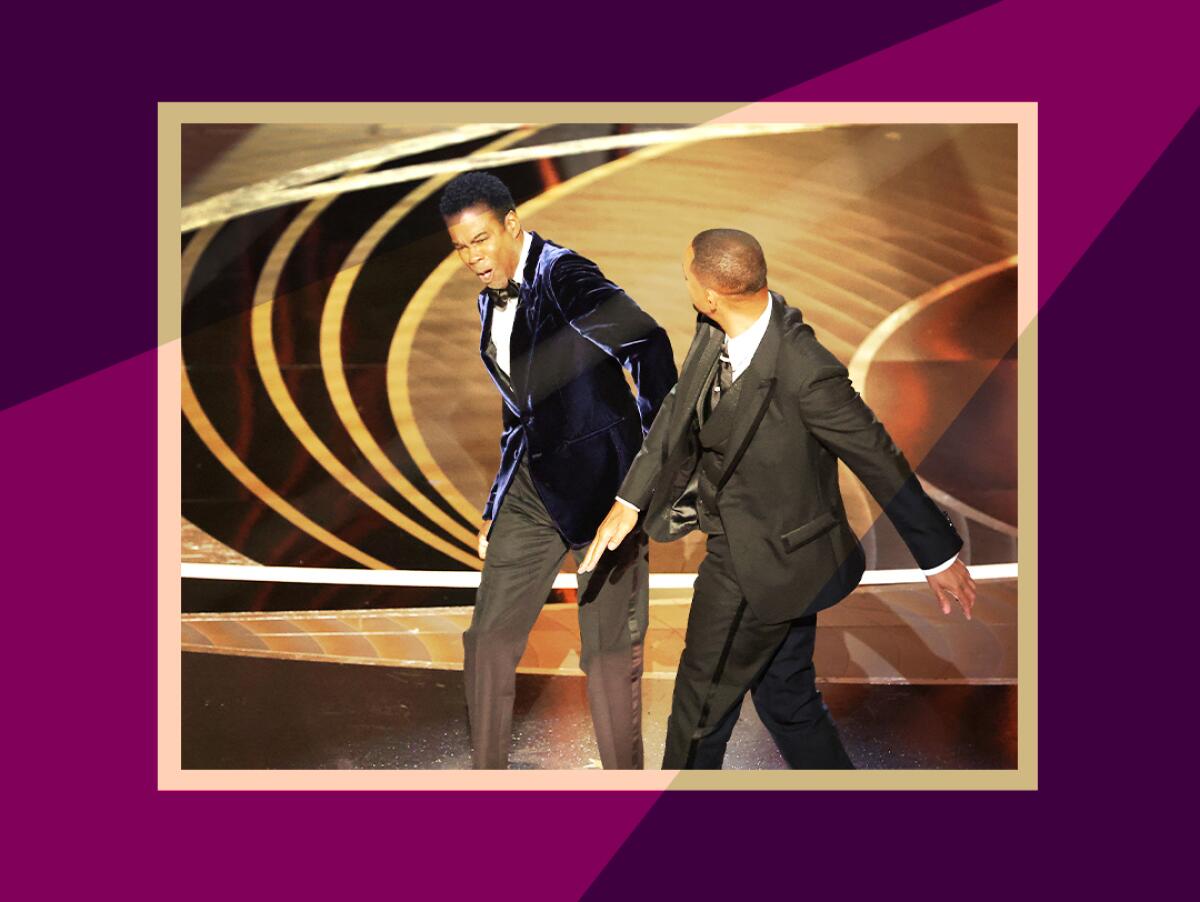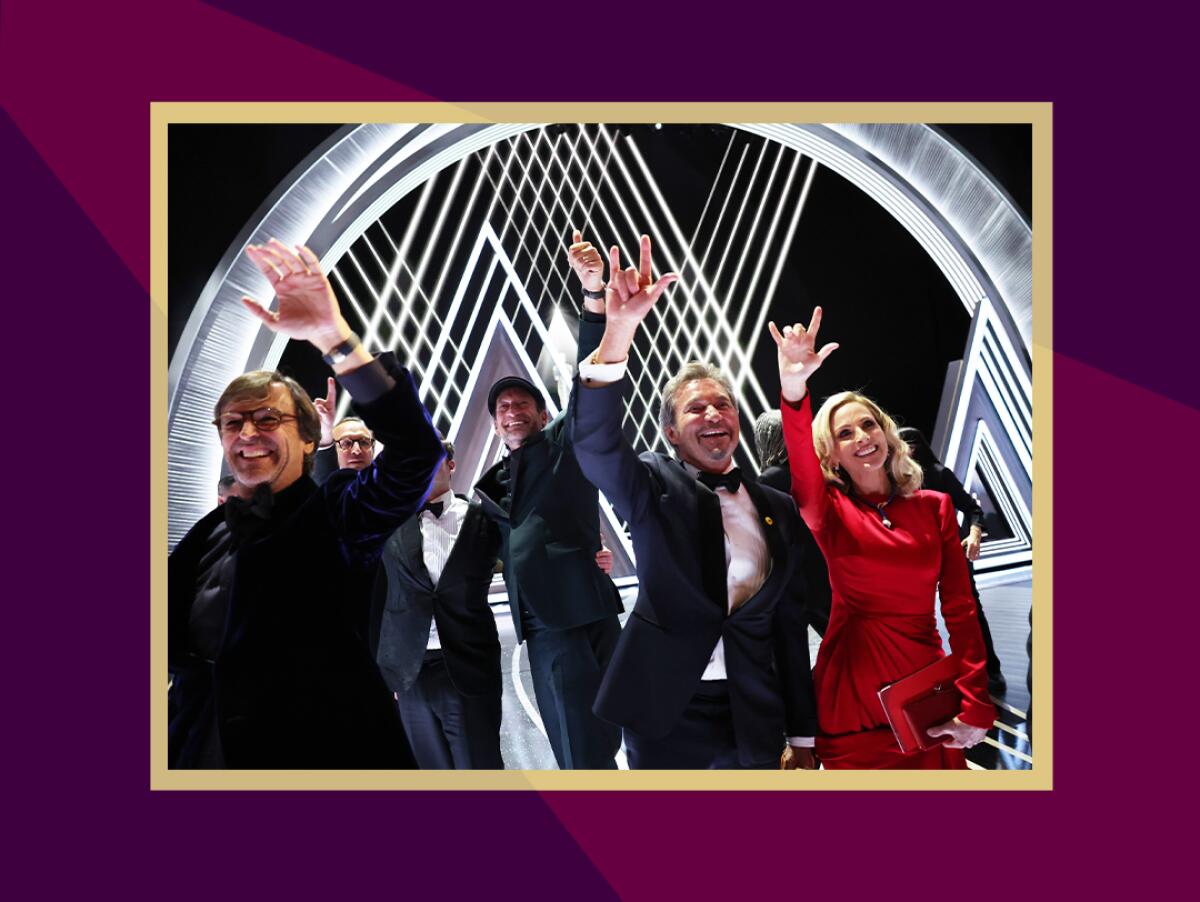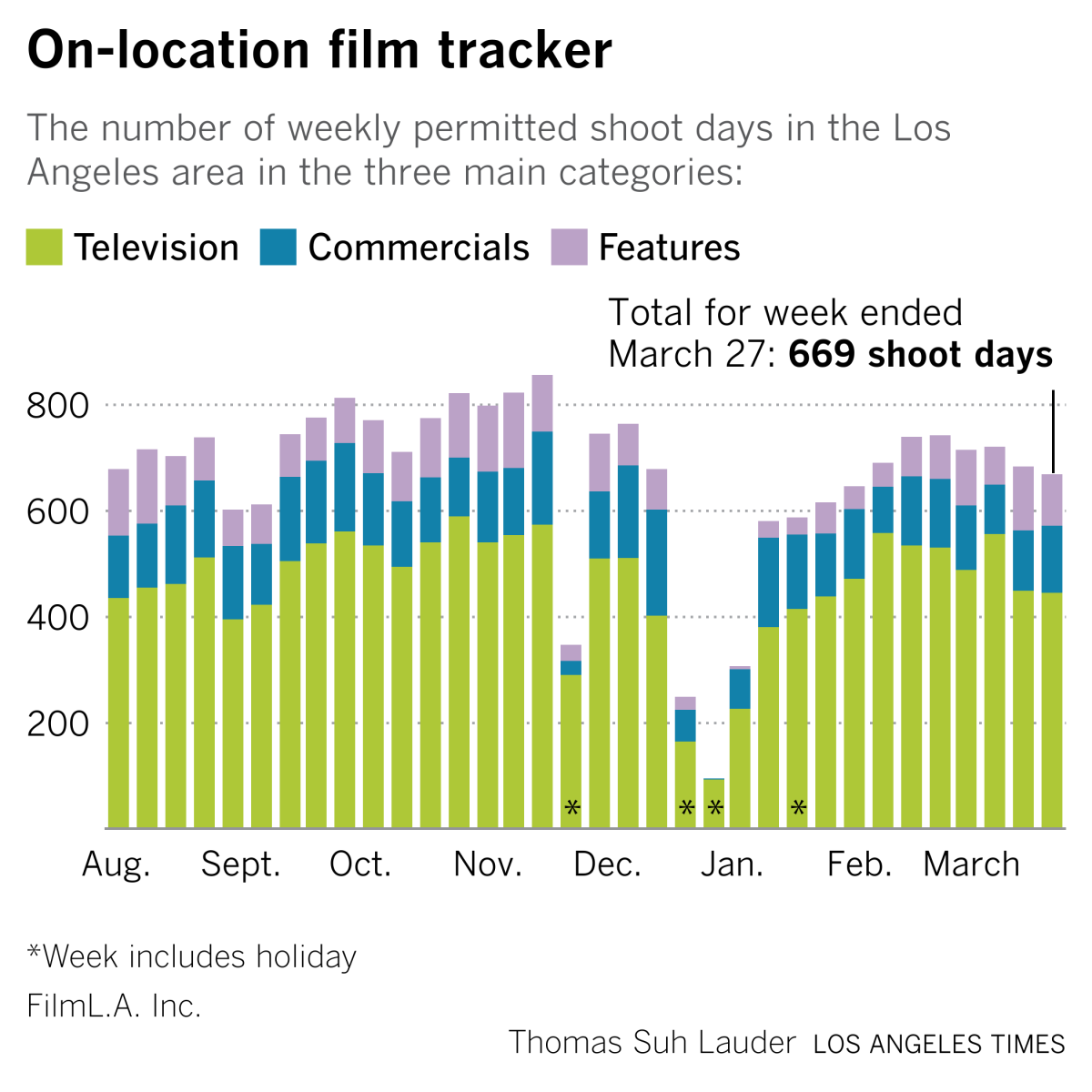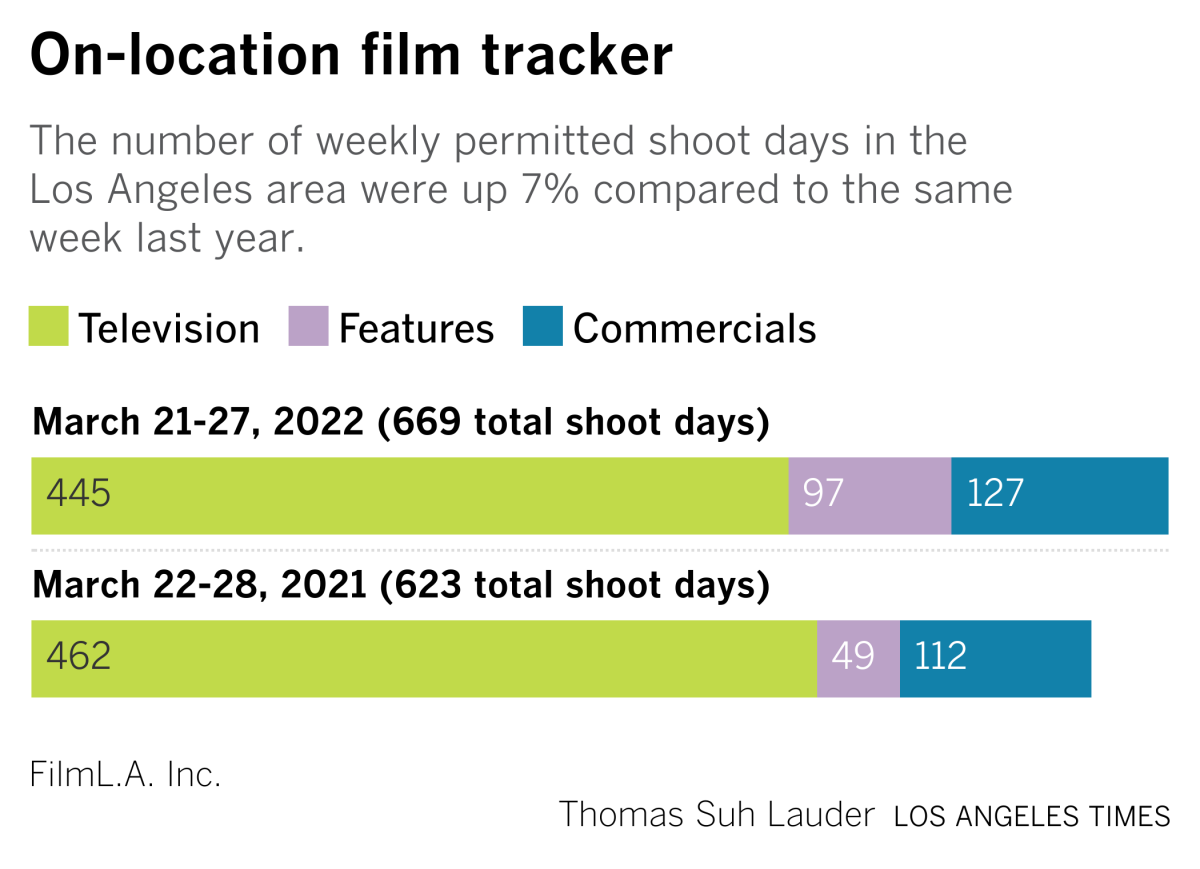Will Smith’s slap made Oscars 2022 ‘good TV’ in the cheapest sense

- Share via
This is the March 29, 2022, edition of the Wide Shot newsletter about the business of entertainment. If this was forwarded to you, sign up here to get it in your inbox.
In the rare event that the Oscars become essential live television viewing — the subject of coveted watercooler conversation — it’s usually for extremely embarrassing reasons.
That does not bode well for the continued relevance of the Academy Awards.
In 2017, sheer ineptitude led Faye Dunaway and Warren Beatty to briefly crown “La La Land” best picture when “Moonlight” was the actual winner.
The mistake made for riveting television, sure, but it tarnished a moment that should have been remembered as a triumph for Barry Jenkins and his gorgeous portrayal of a Black queer experience. It was a moment of joy, but it will forever be remembered as also being kind of a clown show.
Sunday night was, somehow, decisively worse. Even if Will Smith’s brazen slap of Chris Rock during the 94th Academy Awards broadcast generates fleeting interest in the show, that should come as a worrying omen to anyone who cares about the Oscars.
Film lovers should have savored “CODA’s” win as a historic elevation for deaf people and children of deaf adults to one of the world’s biggest stages. An underdog story (as much as one can be called an underdog when having backing from Apple) of a heartwarming indie festival darling taking the movie business’ biggest honor. How many people are talking about that this week, compared to the chatter about Smith’s violent outburst?

Some Oscar haters recoil from the Hollywood spectacle because they see it as a gathering of self-serious, clueless, rich narcissists who can’t take a joke. Others criticize the show for glamorizing an industry rotten with privilege and toxic masculinity. With one open-handed swing, Smith, amazingly, managed to prove them all right.
After half-apologizing and making excuses for his behavior by comparing himself to his “King Richard” character while accepting the Oscar for lead actor, Smith offered a fuller mea culpa in a written Instagram statement on Monday. This time, unlike in his acceptance speech, he directed his apology to Rock, not just to the academy.
“I would like to publicly apologize to you, Chris,” he said in the statement. “I was out of line and I was wrong. I am embarrassed and my actions were not indicative of the man I want to be. There is no place for violence in a world of love and kindness.”
There’s no good reason to believe that people who tuned out the Oscars before the pandemic will ever come back, no matter how many “We Don’t Talk About Bruno’s” Disney produces.
Early Nielsen figures indicate that the Oscars drew an average of 15.4 million viewers, up 56% from last year’s comparable initial figure of 9.85 million (the final number rose to 10.5 million, an all-time low). The figure still pales in comparison to 2020, when the telecast drew 23.6 million viewers.
The bottom line, as we’ve written: Oscar-friendly movies aren’t as popular as they once were and people aren’t watching live TV as they used to, unless there’s a pigskin involved.
But I doubt that this specific kind of absurd spontaneity will help keep people interested. How many viewers are going to sit in front of a 3 1/2-hour ABC telecast on the off chance that the star of “Down to Earth” will get his clock cleaned by a man who credibly played Muhammad Ali?
It’s not the academy’s fault that Smith, however justified in his rage, couldn’t keep his cool until the commercial break. But this is very bad for the Oscars, nonetheless. If it generates interest in the show itself, it will be the cheapest, shallowest kind. The Oscars are supposed to be glamorous and fun. Smith turned it into “Jerry Springer.”
The academy, recognizing the likely reputational damage to itself if it fails to respond, condemned Smith’s actions Monday and said it is conducting a formal review of the incident.
The Oscars have enough to worry about as an institution dedicated to propping up an art form whose status as a centerpiece of popular culture is in long-term decline. They’ve been saddled with helping to save the film business after the practice of moviegoing was upended, probably permanently on some level, by a pandemic that shuttered theaters for months.
Oscars producer Will Packer, who had the thankless job of making the Oscars watchable this year, laughed off the incident with a tweet: “Welp…I said it wouldn’t be boring.”
Packer’s correct. It wasn’t boring. It was gross.
Stuff we wrote
— That was fast. And sad. Shad Khan’s Black News Channel, launched in 2019, is shutting down after the company failed to meet payroll. The announcement means BNC’s staff of 230 — a vast majority of whom are people of color — are out of work, reports Stephen Battaglio.
— It’s always good to have a fallback plan. With that in mind, meet the couple behind Artists Who Code, a group helping artists switch careers to tech. Writes Makeda Easter, “as word spread over the past two years,” the group “has grown to about 280 members across the U.S. and abroad.”
— Blocking Neo. China streamers scrubbed Keanu Reeves titles over his support for Tibet, in the latest example of a Hollywood star running afoul of the Communist Party’s censorship regime. Reeves, Richard Gere and John Cena should get on a conference call.

ABC, Disney and Ukraine
Was it just me, or did the Oscars have more explicit Disney-shilling than usual? Some amount of corporate synergy is to be expected from a big ABC broadcast like the Academy Awards, which is meant to promote moviegoing in general. But this was heavy on Disney moviegoing, specifically.
Chris Evans gave a whole pretaped spiel to hawk “Lightyear,” the new “Toy Story” spinoff. K-pop supergroup BTS went on about how much they loved the “Aladdin” remake and “Coco.”
Oddly absent from the broadcast were explicit mentions of Russia’s assault on Ukraine. Francis Ford Coppola briefly brought it up. Other than that, the telecast paid fleeting tribute to besieged Ukrainians with a series of onscreen text cards and a “moment of silence.”
That followed a vague speech from Mila Kunis, who, as Christi Carras explained, is of Ukrainian descent and has raised more than $35 million for Ukrainian relief with her husband, Ashton Kutcher.
This comes after entertainment companies, including Disney, have promised to stop doing business in Russia amid Putin’s war. Viewers often complain about politics infecting the Oscars. But the lack of direct statements felt odd, given the broad-based non-partisan global support for Ukraine.
Hollywood production
Shoot days in the Los Angeles area fell again last week, but were up compared with the same period of time in 2021, according to data from FilmLA.


You should be reading...
— The real mission impossible is saying “no” to Tom Cruise. Kim Masters on how the franchise superstar lawyered up and out-gunned Paramount executives over costs, COVID-19 and a last-minute submarine. (Hollywood Reporter)
— How Western news outlets are piercing Putin’s propaganda bubble. The Atlantic reports that, “[i]nstead of giving up on their Russian audiences ... international news organizations are trying to exploit gaps within this new digital iron curtain to reach the Russian people.”
— You don’t know much about Jay Penske. And he’s fine with that. A killer headline on the New York Times’ profile of the “quiet Hollywood power broker,” who went on a buying spree that has given him Rolling Stone, South by Southwest and a private island. What more does he want?
— Exposing Hillsong: The church that Justin Bieber made famous. A new docuseries on Discovery+ attempts to contextualize the “meteoric rise and swift downfall” of a hipster pastor. (The Daily Beast)
— What’s the point of all these scammer stories, anyway? Vox’s Alissa Wilkinson dives into “Bad Vegan,” “Inventing Anna,” “The Dropout” and the “real point of the flourishing genre” that really needs an official name at this point. I’m going with “true-con.”
— The New Yorker on the “historical visions” of director Robert Eggers: “The Northman” may be the most accurate Viking movie ever made. It may also be the most ambitious.

Finally... two good things
Amid all the Disney drama of the last few weeks, I binge-listened to the “Blank Check With Griffin & David” podcast miniseries exploring the rise, fall and rebound of John Musker and Ron Clements.
The duo of Disney company men reached extraordinary heights directing “The Little Mermaid” and “Aladdin,” followed by the jaw-dropping low of “Treasure Planet.” Their career nicely charts the so-called Disney Renaissance, and the podcast offers fun insights that help explain why these titles still resonate.
For something completely different ... Tosin Abasi is an unbelievably talented guitarist who has a band called Animals as Leaders. It’s all heavy, virtuosic instrumental progressive rock, and great background music for writing and other tasks that require a lot of focus. For me, anyway. “Parrhesia” is the name of their new album.
Inside the business of entertainment
The Wide Shot brings you news, analysis and insights on everything from streaming wars to production — and what it all means for the future.
You may occasionally receive promotional content from the Los Angeles Times.




